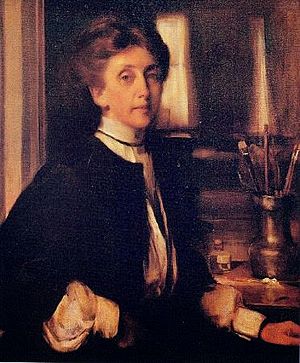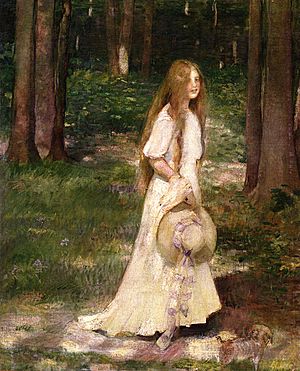Edith Mitchill Prellwitz facts for kids
Quick facts for kids
Edith Mitchill Prellwitz
|
|
|---|---|

Edith Mitchill Prellwitz, self-portrait, 1909
|
|
| Born |
Edith Mitchill
1865 |
| Died | 1944 (aged 78–79) |
Edith Mitchill Prellwitz (1865–1944) was an American artist. She was famous for her paintings of Peconic Bay in New York. Her art often showed beautiful scenes of nature, like those in the Impressionist and Tonalist styles. She also painted people and stories from books or old myths.
Early Life and Learning Art
Edith Mitchill was born in South Orange, New Jersey, in 1865. Her father was a successful businessman. From 1883, she began studying art at the Art Students League. Some of her teachers there were famous artists like George de Forest Brush and William Merritt Chase.
In 1889, Edith helped start the Woman's Art Club of New York. This club was important for women artists. That same year, she traveled to Paris, France. She studied art there for about a year and a half at the Académie Julien. Her teachers included well-known artists such as William-Adolphe Bouguereau. She even showed her art at the famous Paris Salon.
Becoming an Artist
When Edith came back to the United States, she opened her own art studio in New York City. In 1894, she married another artist named Henry Prellwitz. His studio was right across the hall from hers. Henry promised to support her art career as much as his own. They later had a son named Edwin.
In 1899, Edith and Henry started spending time on the north shore of Peconic Bay on Long Island. Their artist friends, Irving Ramsay Wiles and Edward August Bell, already lived there. In 1914, Edith and Henry moved to Peconic Bay permanently. They painted outside, which is called plein air painting. They also worked in their own studios at their home, High House.
Her Art Style and Achievements
Edith Prellwitz painted many different things. She created landscapes and water scenes of Peconic Bay. She also painted still lifes (pictures of objects), inside homes, and people. Her art style changed over time. It included Impressionism, which uses small brushstrokes to show light. She also used Tonalism, which focuses on mood and shadows. Sometimes, her art looked more like traditional, realistic paintings.
She showed her art mostly in the eastern United States. She also displayed her work at big events like the 1901 Pan-American Exposition, where she won a medal. Some of her paintings told stories from books or old myths. She won several awards for these types of works.
For example, in 1894, she won the Second Hallgarten Prize for her painting Hagar. The next year, she won the Norman W. Dodge Prize for her painting Tannhäuser Legend. In 1929, she won the Julia A. Shaw Memorial Prize for The Convalescent. Experts have said her art is as good as that of famous artists like Mary Cassatt and John Singer Sargent.
After Edith and Henry Prellwitz passed away in the early 1940s, their art was not well-known for many years. But in the 1980s, people rediscovered their work. They are now seen as important artists in American art history.
Today, you can find Edith Prellwitz's art in major museums. These include the Metropolitan Museum and the Parrish Art Museum.
See also
 In Spanish: Edith Mitchill Prellwitz para niños
In Spanish: Edith Mitchill Prellwitz para niños
 | Jessica Watkins |
 | Robert Henry Lawrence Jr. |
 | Mae Jemison |
 | Sian Proctor |
 | Guion Bluford |


